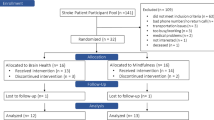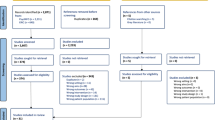Abstract
Objectives
Mindfulness-based stress reduction (MBSR) enhances short-term psychological health in clinical and non-clinical samples, whereas studies examining long-term effects are scarce. This study examined whether the effects of a 7-week MBSR programme on mental health persisted at 2- and 4-year follow-up and explored possible mechanisms of effect.
Methods
In a two-site randomised controlled trial, 288 medical and psychology students were allocated to an MBSR intervention (n = 144) or a no-treatment control group (n = 144). During the 4-year follow-up period, the MBSR group was offered 90-min booster sessions semi-annually. The primary outcome measures were mental distress (General Health Questionnaire (GHQ)) and subjective well-being (SWB); these were measured at baseline (T0) and post-intervention follow-up at 1 month (T1), 2 years (T1) and again at 4 years (T3). Secondary outcomes included coping, mindfulness and meditation practice.
Results
At 4-year follow-up, the MBSR group showed significantly better scores on mental distress, mindfulness, avoidance coping and problem-focused coping (Cohen’s d = 0.23–0.42). Meditation practice positively predicted long-term mindfulness scores. Short-term effects in mindfulness scores mediated long-term intervention effects in mental distress and coping. However, reversed mediation was also observed (i.e. changes in outcome mediating long-term mindfulness scores), and this indicates that initial changes in outcome and mindfulness are intrinsically intertwined and may both influence long-term effects. Small post-intervention effects on well-being and seeking social support did not persist at follow-up.
Conclusions
MBSR fostered enduring effects on mental distress and coping in medical and psychology students 4 years post-intervention.

Similar content being viewed by others
References
Amutio, A., Martinez-Taboada, C., Hermosilla, D., & Delgado, L. C. (2015). Enhancing relaxation states and positive emotions in physicians through a mindfulness training program: a one-year study. Psychology, Health & Medicine, 20(6), 720–731.
Arch, J. J., & Craske, M. G. (2006). Mechanisms of mindfulness: emotion regulation following a focused breathing induction. Behaviour Research and Therapy, 44(12), 1849–1858.
Baer, R. A. (2011). Measuring mindfulness. Contemporary Buddhism, 12(1), 241–261.
Baer, R. A., Smith, G. T., Hopkins, J., Krietemeyer, J., & Toney, L. (2006). Using self-report assessment methods to explore facets of mindfulness. Assessment, 13(1), 27–45.
Baer, R. A., Carmody, J., & Hunsinger, M. (2012). Weekly change in mindfulness and perceived stress in a mindfulness-based stress reduction program. Journal of Clinical Psychology, 68(7), 755–765.
Bergen-Cico, D., Possemato, K., & Cheon, S. (2013). Examining the efficacy of a brief mindfulness-based stress reduction (Brief MBSR) program on psychological health. Journal of American College Health, 61(6), 348–360.
Berghmans, C., Godard, R., Joly, J., Tarquinio, C., & Cuny, P. (2012). Effects of the mindfulness based stress reduction (MBSR) approach on psychic health (stress, anxiety, depression) and coping mode of diabetic patients: a controlled and randomized pilot study. Annales Médico-Psychologiques, 170(5), 312–317.
Bohlmeijer, E., Prenger, R., Taal, E., & Cuijpers, P. (2010). The effects of mindfulness-based stress reduction therapy on mental health of adults with a chronic medical disease: a meta-analysis. Journal of Psychosomatic Research, 68(6), 539–544.
Britton, W. B., Shahar, B., Szepsenwol, O., & Jacobs, W. J. (2012). Mindfulness-based cognitive therapy improves emotional reactivity to social stress: results from a randomized controlled trial. Behaviour Therapy, 43(2), 365–380.
Brown, K. W., Ryan, R. A., & Creswell, J. D. (2007). Mindfulness: theoretical foundations and evidence for its salutary effects. Psychological Inquiry, 18(4), 211–237.
Burton, A., Burgess, C., Dean, S., Koutsopoulou, G. Z., & Hugh-Jones, S. (2016). How effective are mindfulness-based interventions for reducing stress among healthcare professionals? A systematic review and meta-analysis. Stress and Health, 33(1), 3–13.
Carlson, L. E., Speca, M., Faris, P., & Patel, K. D. (2007). One year pre-post intervention follow-up of psychological, immune, endocrine and blood pressure outcomes of mindfulness-based stress reduction (MBSR) in breast and prostate cancer outpatients. Brain, Behavior, and Immunity, 21(8), 1038–1049.
Chakraborty, H., & Gu, H. (2009). A mixed model approach for intent-to- treat analysis in longitudinal clinical trials with missing values. RTI Press publication No. MR-0009-0903. Research Triangle Park: RTI International Retrieved 6.9.18 from http://www.rti.org/rtipress.
Chien, W. T., & Thompson, D. R. (2014). Effects of a mindfulness-based psychoeducation programme for Chinese patients with schizophrenia: 2-year follow-up. British Journal of Psychiatry, 205(1), 52–59.
Cohen, J. (1988). Statistical power analysis for the behavioral sciences (2nd ed.). Hillsdale: L. Erlbaum Associates.
Cohen, J. S., & Miller, L. J. (2009). Interpersonal mindfulness training for well-being: A pilot study with psychology graduate students. Teachers College Record, 111(12), 2760–2774.
Cousin, G., & Crane, C. (2016). Changes in disengagement coping mediate changes in affect following mindfulness-based cognitive therapy in a non-clinical sample. British Journal of Psychology, 107 (3), 434–447.
Curtiss, J., & Klemanski, D. H. (2014). Teasing apart low mindfulness: Differentiating deficits in mindfulness and in psychological flexibility in predicting symptoms of generalized anxiety disorder and depression. Journal of Affective Disorders, 166, 41–47.
Desrosiers, A., Vine, V., Curtiss, J., & Klemanski, D. H. (2014). Observing nonreactively: a conditional process model linking mindfulness facets, cognitive emotion regulation strategies, and depression and anxiety symptoms. Journal of Affective Disorders, 165, 31–37.
de Vibe, M., Solhaug, I., Tyssen, R., Friborg, O., Rosenvinge, J. H., Sorlie, T., & Bjorndal, A. (2013). Mindfulness training for stress management: a randomised controlled study of medical and psychology students. BMC Medical Education, 13, 107.
de Vibe, M., Bjørndal, A., Fattah, S., Dyrdal, G. M., Halland, E., & Tanner-Smith, E. E. (2017). Mindfulness-based stress reduction (MBSR) for improving health, quality of life, and social functioning in adults. Campbell Systematic Reviews, 13(11).
Dundas, I., Vøllestad, J., Binder, P. E., & Sivertsen, B. (2013). The five factor mindfulness questionnaire in Norway. Scandinavian Journal of Psychology, 54(3), 250–260.
Eberth, J., & Sedlmeier, P. (2012). The effects of mindfulness meditation: a meta-analysis. Mindfulness, 3(3), 174–189.
Edwards, J. R., & Baglioni, A. J. (1993). The measurement of coping with stress: construct validity of the ways of coping checklist and the cybernetic coping scale. Work and Stress, 7(1), 17–31.
Egbewale, B. E., Lewis, M., & Sim, J. (2014). Bias, precision and statistical power of analysis of covariance in the analysis of randomized trials with baseline imbalance: a simulation study. BMC Medical Research Methodology, 14(49). https://doi.org/10.1186/1471-2288-14-49.
Fjorback, L. O., Arendt, M., Ornbol, E., Walach, H., Rehfeld, E., Schroder, A., & Fink, P. (2013). Mindfulness therapy for somatization disorder and functional somatic syndromes - randomized trial with one-year follow-up. Journal of Psychosomatic Research, 74(1), 31–40.
Garland, E. L., Gaylord, S., & Park, J. (2009). The role of mindfulness in positive reappraisal. Explore-the Journal of Science and Healing, 5(1), 37–44.
Goldberg, D., & Williams, P. (1988). A user’s guide to the General Health Questionnaire. Windsor: NFER.
Goldberg, S. B., Del Re, A. C., Hoyt, W. T., & Davis, J. M. (2014). The secret ingredient in mindfulness interventions? A case for practice quality over quantity. Journal of Counseling Psychology, 61(3), 491–497.
Gotink, R. A., Chu, P., Busschbach, J. J. V., Benson, H., Fricchione, G. L., & Hunink, M. G. M. (2015). Standardised mindfulness-based interventions in healthcare: an overview of systematic reviews and meta-analyses of RCTs. PLoS One, 10(4). https://doi.org/10.1371/journal.pone.0124344.
Goyal, M., Singh, S., Sibinga, E. M. S., Gould, N. F., Rowland-Seymour, A., Sharma, R., . . . Haythornthwaite, J. A. (2014). Meditation programs for psychological stress and well-being: a systematic review and meta-analysis. JAMA Internal Medicine, 174(3), 357–368.
Grossman, P. (2011). Defining mindfulness by how poorly I think I pay attention during everyday awareness and other intractable problems for psychology's (re) invention of mindfulness: comment on Brown et al. (2011). Psychological Assessment, 23(4), 1034–1040.
Grossman, P. (2015). Mindfulness: awareness informed by an embodied ethic. Mindfulness, 6(1), 17–22.
Grossman, P., Tiefenthaler-Gilmer, U., Raysz, A., & Kesper, U. (2007). Mindfulness training as an intervention for fibromyalgia: evidence of postintervention and 3-year follow-up benefits in well-being. Psychotherapy and Psychosomatics, 76(4), 226–233.
Gu, J., Strauss, C., Bond, R., & Cavanagh, K. (2015). How do mindfulness-based cognitive therapy and mindfulness-based stress reduction improve mental health and wellbeing? A systematic review and meta-analysis of mediation studies. Clinical Psychology Review, 37, 1–12.
Halland, E., De Vibe, M., Solhaug, I., Tyssen, R., Friborg, O., Rosenvinge, J. H., . . . Bjørndal, A. (2015). Mindfulness training improves problem-focused coping in psychology and medical students. College Student Journal 49(3), 387–398.
Hayes, A. F. (2013). Introduction to mediation, moderation, and conditional process analysis: A regression-based approach. New York: Guilford Press.
Hayes, S. C., Strosahl, K., Wilson, K. G., Bissett, R. T., Pistorello, J., Toarmino, D., . . . McCurry, S. M. (2004). Measuring experiential avoidance: a preliminary test of a working model. Psychological Record, 54(4), 553–578.
Hayes, S. C., Strosahl, K. D., & Wilson, K. G. (2012). Acceptance and commitment therapy: The process and practice of mindful change (2nd ed.). New York: Guilford Press.
Henderson, V., Clemow, L., Massion, A., Hurley, T., Druker, S., & Hebert, J. R. (2012). The effects of mindfulness-based stress reduction on psychosocial outcomes and quality of life in early-stage breast cancer patients: a randomized trial. Breast Cancer Research and Treatment, 131(1), 99–109.
Hofmann, S. G., Sawyer, A. T., Witt, A. A., & Oh, D. (2010). The effect of mindfulness-based therapy on anxiety and depression: a meta-analytic review. Journal of Consulting and Clinical Psychology, 78(2), 169–183.
Holm, M., Tyssen, R., Stordal, K. I., & Haver, B. (2010). Self-development groups reduce medical school stress: a controlled intervention study. BMC Medical Education, 10, 23.
Kabat-Zinn, J. (2005). Full catastrophe living: Using the wisdom of your body and mind to face stress, pain and illness. New York: Bantam Dell.
Kabat-Zinn, J., Lipwoth, L., Burncy, R., & Sellers, W. (1987). Four-year follow-up of a meditation-based program for the self-regulation of chronic pain: treatment outcomes and compliance. The Clinical Journal of Pain, 2(3), 159–173.
Kazdin, A. E. (2007). Mediators and mechanisms of change in psychotherapy research. Annual Review of Clinical Psychology, 3, 1–27.
Keng, S.-L., Smoski, M. J., Robins, C. J., Ekblad, A. G., & Brantley, J. G. (2012). Mechanisms of change in mindfulness-based stress reduction: self-compassion and mindfulness as mediators of intervention outcomes. Journal of Cognitive Psychotherapy, 26(3), 270–280.
Khoury, B., Lecomte, T., Fortin, G., Masse, M., Therien, P., Bouchard, V., . . . Hofmann, S. G. (2013). Mindfulness-based therapy: a comprehensive meta-analysis. Clinical Psychology Review, 33(6), 763–771.
Khoury, B., Sharma, M., Rush, S. E., & Fournier, C. (2015). Mindfulness-based stress reduction: a meta-analysis. Journal of Psychosomatic Research, 78(6), 519–528.
Kjeldstadli, K., Tyssen, R., Finset, A., Hem, E., Gude, T., Gronvold, N., . . . Vaglum, P. (2006). Life satisfaction and resilience in medical school: a six-year longitudinal, nationwide and comparative study, BMC Medical Education, 6(1), 48.
Krasner, M. S., Epstein, R. M., Beckman, H., Suchman, A. L., Chapman, B., Mooney, C. J., & Quill, T. E. (2009). Association of an educational program in mindful communication with burnout, empathy, and attitudes among primary care physicians. Journal of the American Medical Association, 302(12), 1284–1293.
Kuyken, W., Watkins, E., Holden, E., White, K., Taylor, R. S., Byford, S., . . . Dalgleish, T. (2010). How does mindfulness-based cognitive therapy work? Behaviour Research and Therapy, 48(11), 1105–1112.
Lilja, J. L., Frodi-Lundgren, A., Hanse, J. J., Josefsson, T., Lundh, L. G., Skold, C., . . . Broberg, A. G. (2011). Five facets mindfulness questionnaire-reliability and factor structure: a Swedish version. Cognitive Behavioral Therapy, 40(4), 291–303.
Lubans, D. R., Foster, C., & Biddle, S. J. H. (2008). A review of mediators of behavior in interventions to promote physical activity among children and adolescents. Preventive Medicine, 47(5), 463–470.
Ludwig, A. B., Burton, W., Weingarten, J., Milan, F., Myers, D. C., & Kligler, B. (2015). Depression and stress amongst undergraduate medical students. BMC Medical Education, 15, 141.
Malarkey, W. B., Jarjoura, D., & Klatt, M. (2013). Workplace based mindfulness practice and inflammation: a randomized trial. Brain, Behavior, and Immunity, 27(1), 145–154.
Meadows, G. N., Shawyer, F., Enticott, J. C., Graham, A. L., Judd, F., Martin, P. R., . . . Segal, Z. (2014). Mindfulness-based cognitive therapy for recurrent depression: a translational research study with 2-year follow-up. Australian and New Zealand Journal of Psychiatry, 48(8), 743–755.
Miller, J. J., Fletcher, K., & Kabat-Zinn, J. (1995). Three-year follow-up and clinical implications of a mindfulness meditation-based stress reduction intervention in the treatment of anxiety disorders. General Hospital Psychiatry, 17(3), 192–200.
Moffat, K. J., McConnachie, A., Ross, S., & Morrison, J. M. (2004). First year medical student stress and coping in a problem-based learning medical curriculum. Medical Education, 38(5), 482–491.
Moum, T., Naess, S., Sorensen, T., Tambs, K., & Holmen, J. (1990). Hypertension labeling, life events and psychological well-being. Psychological Medicine, 20(3), 635–646.
Nerdrum, P., Rustøen, T., & Rønnestad, M. H. (2006). Student psychological distress: a psychometric study of 1750 Norwegian 1st-year undergraduate students. Scandinavian Journal of Educational Research, 50(1), 95–109.
Niemi, P. M., & Vainiomaki, P. T. (2006). Medical students' distress--quality, continuity and gender differences during a six-year medical programme. Medical Teacher, 28(2), 136–141.
Raes, F., Dewulf, D., van Heeringen, C., & Williams, J. M. (2009). Mindfulness and reduced cognitive reactivity to sad mood: evidence from a correlational study and a non-randomized waiting list controlled study. Behaviour Research and Therapy, 47(7), 623–627.
Roth, D. L., & MacKinnon, D. P. (2013). Mediation analysis with longitudinal data. In J. Newsome, R. N. Jones, & S. M. Hofer (Eds.), Longitudinal data analysis: a practical guide for researchers in aging, health, and social sciences (pp. 181–216). London: Routledge.
Røysamb, E., Harris, J. R., Magnus, P., Vittersø, J., & Tambs, K. (2002). Subjective well-being: sex-specific effects of genetic and environmental factors. Personality and Individual Differences, 32(2), 211–223.
Shanafelt, T. D., Balch, C. M., Bechamps, G., Russell, T., Dyrbye, L., Satele, D., . . . Freischlag, J. (2010). Burnout and medical errors among American surgeons. Annals of Surgery, 251(6), 995–1000.
Shapiro, S. L., Carlson, L. E., Astin, J. A., & Freedman, B. (2006). Mechanisms of mindfulness. Journal of Clinical Psychology, 62(3), 373–386.
Shapiro, S. L., Brown, K. W., Thoresen, C., & Plante, T. G. (2011). The moderation of mindfulness-based stress reduction effects by trait mindfulness: results from a randomized controlled trial. Journal of Clinical Psychology, 67(3), 267–277.
Snippe, E., Nyklicek, I., Schroevers, M. J., & Bos, E. H. (2015). The temporal order of change in daily mindfulness and affect during mindfulness-based stress reduction. Journal of Counseling Psychology, 62(2), 106–114.
Solhaug, I., Eriksen, T. E., de Vibe, M., Haavind, H., Friborg, O., Sørlie, T., & Rosenvinge, J. H. (2016). Medical and psychology student's experiences in learning mindfulness: benefits, paradoxes, and pitfalls. Mindfulness, 7, 838. https://doi.org/10.1007/s12671-016-0521-0.
Surrey, J. L., & Kramer, G. (2013). Relational mindfulness. In C. K. Germer, R. D. Siegel, & P. R. Fulton (Eds.), Mindfulness and psychotherapy (2nd ed., pp. 94–111). New York: Guilford Press.
Teasdale, J. D., Segal, Z. V., Williams, J. M. G., Ridgeway, V. A., Soulsby, J. M., & Lau, M. A. (2000). Prevention of relapse/recurrence in major depression by mindfulness-based cognitive therapy. Journal of Consulting and Clinical Psychology, 68(4), 615–623.
Twisk, J. W. R. (2006). Applied multilevel analysis : A practical guide. Cambridge: Cambridge University Press.
Tyssen, R., Vaglum, P., Gronvold, N. T., & Ekeberg, O. (2001). Factors in medical school that predict postgraduate mental health problems in need of treatment: a nationwide and longitudinal study. Medical Education, 35(2), 110–120.
van der Velden, A. M., Kuyken, W., Wattar, U., Crane, C., Pallesen, K. J., Dahlgaard, J., et al. (2015). A systematic review of mechanisms of change in mindfulness-based cognitive therapy in the treatment of recurrent major depressive disorder. Clinical Psychology Review, 37, 26–39.
Vettese, L. C., Toneatto, T., Stea, J. N., Nguyen, L., & Wang, J. J. (2009). Do mindfulness meditation participants do their homework? And does it make a difference? A review of the empirical evidence. Journal of Cognitive Psychotherapy, 23(3), 198–225.
Vitaliano, P. P., Russo, J., Carr, J. E., & Heerwagen, J. H. (1984). Medical school pressures and their relationship to anxiety. Journal of Nervous and Mental Disease, 172(12), 730–736.
Wen, Z. L., & Fan, X. T. (2015). Monotonicity of effect sizes: questioning kappa-squared as mediation effect size measure. Psychological Methods, 20(2), 193–203. https://doi.org/10.1037/met0000029.
Witek-Janusek, L., Albuquerque, K., Chroniak, K. R., Chroniak, C., Durazo-Arvizu, R., & Mathews, H. L. (2008). Effect of mindfulness based stress reduction on immune function, quality of life and coping in women newly diagnosed with early stage breast cancer. Brain, Behavior, and Immunity, 22(6), 969–981.
Acknowledgements
We warmly thank all of the students who participated in this study.
Funding
We would like to thank the Norwegian Medical Association, the Northern Norway Regional Health Authority and the Norwegian Knowledge Centre for the Health Services for funding this research project. These funding sources had no role in conducting the study.
Author information
Authors and Affiliations
Contributions
IS designed and executed the study, analysed the data and wrote the paper. MdV designed and executed the study and assisted with the data analyses and the writing. OF analysed the data and wrote part of the methods and results. RT, TS and AB collaborated in the design and the writing of the study. JHR collaborated in the design and writing and editing of the final manuscript. All authors approved the final version of the manuscript for submission.
Corresponding author
Ethics declarations
Conflict of Interest
The authors declare that they have no conflict of interests.
Ethics Statement
The study was approved by the Regional Committee for Medical and Health Research Ethics in Norway and the Norwegian Data Inspectorate. All participants provided informed consent.
Additional information
Publisher’s Note
Springer Nature remains neutral with regard to jurisdictional claims in published maps and institutional affiliations.
All data are available at the Open Science Framework (https://osf.io/akbjc/).
Rights and permissions
About this article
Cite this article
Solhaug, I., de Vibe, M., Friborg, O. et al. Long-term Mental Health Effects of Mindfulness Training: a 4-Year Follow-up Study. Mindfulness 10, 1661–1672 (2019). https://doi.org/10.1007/s12671-019-01100-2
Published:
Issue Date:
DOI: https://doi.org/10.1007/s12671-019-01100-2




